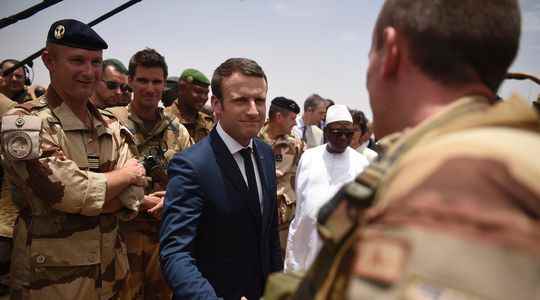Ambassador Joël Meyer barely had time to turn off the light on his way out. A last glance at his residence in Bamako, a passage in front of the guard of honor of his staff… and then he leaves. The diplomat bade farewell to the country on February 2 and embarked for the airport. The Malian colonels, in power since their putsch in August 2020, had given him 72 hours to leave. Last step before the official rupture of diplomatic relations, this expulsion formalized the divorce between the Elysee Palace and the Koulouba Palace, after a verbal one-upmanship very far from the customs between two allied countries. It should lead, in all likelihood, to the withdrawal of the 2,500 French soldiers engaged in Mali in the anti-terrorist operation Barkhane – which includes 5,000 men in the Sahel.
This departure through the back door, after nine years of fighting terrorism with mixed results, comes at the worst time for Emmanuel Macron, in the midst of the presidential election campaign. “The junta has pushed France to the fault,” says Antoine Glaser, journalist and co-author of the book Macron’s African Trap (Fayard, 2021). But what fault? Having called the authorities “illegitimate”, in the words, at the end of January, of the Minister of Foreign Affairs, Jean-Yves Le Drian.
“Many elements can explain the deterioration of relations between Paris and Bamako, observes Richard Moncrieff, Sahel director of the International Crisis Group. On the one hand, the growing popular hostility towards France, linked to the failure of Barkhane to provide solutions to the security crisis fueled by infox.On the other hand, the obstinacy of the colonels to seize power – they have in fact announced the extension of the transition for a period of four to five years. And, finally, the Russian factor.” In other words, the landing on Malian soil, at the end of 2021, of mercenaries from the private company Wagner, considered the Kremlin’s Trojan horse.
France’s African policy “out of breath”
Worse, Bamako insinuates that the French have only to blame themselves. At the podium of the United Nations, on September 25, the head of the Malian government, Choguel Maïga, accuses Paris of “abandonment in full flight” in the fight against terrorism, judging not to have been consulted enough before the announcement. this summer, by Emmanuel Macron, of the downsizing of Barkhane and the closure of several bases in Mali. The gear is engaged. And the brood between the two capitals is now spreading in the public square.
At the arrow shot by Choguel Maïga, Emmanuel Macron retorts: “The Malian Prime Minister is the child of two coups d’etat”. “On the redeployment of Barkhane, there has obviously not been enough consultation with the local authorities, concedes a former French diplomat in Mali. At least in the presentation, it would have been necessary to hold a joint press conference, with the heads state of the region. But the Elysée did not anticipate the backlash. “The fact of the prince” and “French arrogance”, squeak divergent voices at the Quai d’Orsay. Because the malaise goes beyond, in reality, the current soap opera between Paris and Bamako, a symptom of an African policy “out of breath”, according to another diplomat on the continent.
Proof of France’s blindness, “we thought we could win the showdown with the Malian authorities”, continues this source. But Bamako, aware of the political gain in overpowering the former colonizer, went all the way. “Let’s not forget that in Mali, the evacuation of French military bases after independence was a source of national pride”, recalls this connoisseur of the region. By expelling the ambassador and, before him, Danish soldiers participating in Barkhane’s effort, the Malian junta neutralizes the raison d’être of Barkhane, which responds to “the request of the States”, insists Emmanuel Macron .
And now ? The French executive favors a scenario of withdrawal towards Niger, Chad and the West African coastal states in a less visible military system, leaving the local armies in the front line. Hoping not to know, in these countries, the same fate as in Mali.
